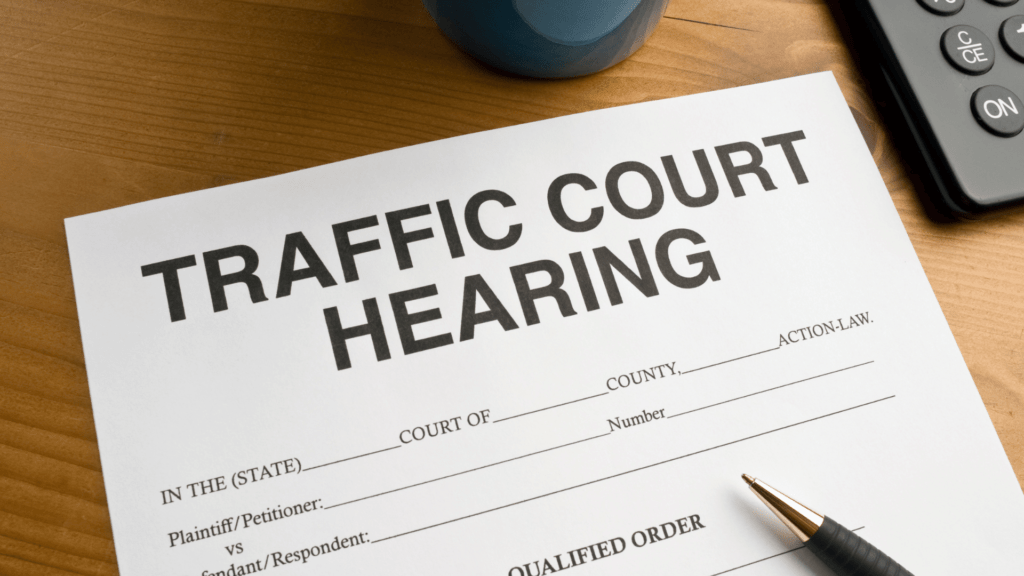Navigating traffic court involves understanding the legal process and your rights, as well as preparing a solid defense or exploring alternative resolutions.
It’s essential to be aware of the specific traffic laws that apply to your case, as well as any potential legal ramifications. Knowing your rights, such as the right to legal representation and the right to challenge evidence, can significantly impact the outcome of your case.
Familiarizing yourself with the available legal options, such as plea bargains or traffic school, can help you make informed decisions throughout the proceedings. Ultimately, effectively navigating traffic court requires a comprehensive understanding of the legal intricacies and a strategic approach to achieving a favorable resolution.
The Traffic Ticket and Notice to Appear
The traffic ticket, often accompanied by a Notice to Appear, serves as the initial legal documentation outlining the alleged violation and the assigned court date.
Options to Take Care of Your Traffic Ticket
When facing a traffic ticket, individuals have various options to address it, such as paying the fine, contesting the citation, or exploring alternative resolutions provided by the court system.
Pay the Ticket (Don’t Contest It)
Opting to pay the traffic ticket without contesting it entails acknowledging the violation and fulfilling the associated financial obligations, which may conclude the legal proceedings.
Upon receiving a traffic ticket, individuals have the option to pay the fine without contesting, thus admitting to the offense. By paying the fine, one avoids the time-consuming process of challenging the citation in court. It also mitigates the risk of facing additional penalties or court appearances. Once the payment is made, it signifies compliance with the legal requirements.
However, failure to pay the ticket could result in escalated fines, suspension of driving privileges, or even a warrant for arrest in certain jurisdictions.
Contest the Ticket at a Trial
Contesting the traffic ticket at a trial involves presenting evidence, witness statements, and legal arguments before a judge to challenge the alleged violation and seek a favorable verdict.
During the trial, the presentation of evidence is crucial, as it allows the defendant to demonstrate any mitigating circumstances or discrepancies in the prosecution’s case. This could include providing documents, photographs, or testimonies to support their claims. Witness statements play a significant role in corroborating the defense’s version of events.
The legal proceedings entail adherence to the rules of evidence, courtroom decorum, and respectful interaction with the judge. The judge, in turn, impartially evaluates the presented evidence and arguments, applying the law to make a reasoned determination.
If You Ignore the Ticket
Ignoring a traffic ticket can lead to severe consequences, potentially resulting in additional penalties, legal action, and a negative impact on one’s driving record and privileges.
You Could Be Found Guilty, Owe the Money, and Face More Penalties
Failure to address a traffic ticket may lead to a guilty verdict, resulting in financial obligations, additional penalties, and potential legal actions that further complicate the situation.
Once a guilty verdict has been reached due to the non-resolution of a traffic ticket, the financial implications can be significant. Along with the initial fine, there may be court costs, increased insurance premiums, and the potential for a suspended or revoked driver’s license. These additional penalties could result in a substantial financial burden and significantly impact the individual’s driving privileges.
You Can Still Ask for Your Fines to Be Reduced or Even Canceled
Despite ignoring the initial ticket, individuals may still have the opportunity to request a reduction or dismissal of fines through subsequent legal actions or negotiations with the appropriate authorities.
One avenue for seeking a reduction of fines is to seek advice from a lawyer specialized in traffic violations. Legal procedures such as filing a formal appeal or seeking a plea bargain may also be utilized. Negotiation with the prosecutor’s office or participating in a traffic school program can also contribute to resolving the issue and potentially reducing the fines. These processes may yield favorable outcomes, including lowered fines, reduced points on the driving record, or even a complete dismissal of the charges.
Have a Question About Traffic?
If you have inquiries or concerns regarding traffic matters, legal assistance is readily available to provide guidance and support, ensuring that you make informed decisions about your case.
Whether you are facing a speeding ticket, reckless driving charge, or any other traffic violation, it’s essential to understand your rights and options. Seeking legal advice can help you navigate the complexities of traffic laws and regulations, potentially minimizing the impact on your driving record and insurance premiums.
Experienced traffic attorneys can assess the details of your case, identify potential defenses or mitigation strategies, and represent you in court if necessary. By seeking legal assistance, you can gain clarity on the best course of action and ensure that your rights are protected throughout the legal process.
Get Prepared for Traffic Court
Preparation for traffic court entails gathering necessary documents, understanding the alleged violation, and considering the option of legal representation to navigate the legal proceedings effectively.
Gather Essential Documents and Evidence
Collecting essential documents and evidence is crucial to building a strong case and presenting a compelling defense during the traffic court proceedings.
Gathering crucial documents such as the vehicle registration, driver’s license, and any relevant traffic citations is the foundation of a solid defense strategy. Additionally, obtaining witness statements, traffic camera footage, and expert opinions can significantly strengthen arguments and provide substantial support for legal claims. These pieces of evidence can help refute allegations, establish timelines, and bolster legal reasoning, ultimately increasing the chances of a favorable outcome in the court.
Research and Understand the Alleged Traffic Violation
Comprehensive research and understanding of the alleged traffic violation are essential for formulating a strategic defense and addressing the specific legal nuances associated with the citation.
Delving into the details of the alleged traffic violation involves analyzing the circumstances surrounding the incident, assessing applicable traffic laws, and understanding potential defenses. It’s crucial to scrutinize any relevant evidence, such as witness statements or traffic camera footage, to build a comprehensive understanding. This understanding will inform the approach to defense, such as challenging the accuracy of the citation or raising mitigating factors.
By encompassing these essential aspects, the defense strategy can be tailored to address the specific complexities of the alleged traffic violation.
Consider Hiring a Traffic Ticket Defense Lawyer
Engaging the services of an experienced traffic ticket defense lawyer can provide invaluable legal assistance, strategic representation, and advocacy to navigate the complexities of traffic court effectively.
These legal professionals possess an in-depth understanding of traffic laws, regulations, and the judicial process, enabling them to develop a robust defense strategy tailored to each client’s unique circumstances. With their expertise, traffic ticket defense lawyers can challenge the evidence presented by law enforcement, negotiate for reduced charges or penalties, and strive to secure a favorable outcome on behalf of their clients. Their comprehensive knowledge and courtroom experience give individuals the best chance of minimizing the impact of traffic violations on their driving record, insurance premiums, and overall legal standing.
The Day of the Traffic Court Appearance
The day of the court appearance requires thorough preparation, adherence to formalities, and a focused approach to effectively address the traffic violation and present a compelling case.
Unraveling the Traffic Court Process
The traffic court process entails various stages, including opening statements, evidence presentation, and the rendering of a verdict, each of which requires thorough preparation and strategic navigation.
Opening Statements and Introduction
The opening statements and introduction at traffic court serve as crucial initial presentations, setting the tone for the subsequent legal proceedings and arguments to be presented.
These initial presentations create the framework for the entire court session, shaping the judge’s perception and establishing the context for the case at hand. A well-crafted introduction can provide a clear overview of the case, highlighting key points and setting the stage for the legal arguments to follow. It allows the parties involved to capture the attention of the court and assert the main issues and legal theories to be supported throughout the proceedings.
Presenting Evidence and Witnesses
The presentation of evidence and witness testimonies forms a critical part of the traffic court process, offering the opportunity to substantiate legal claims and challenge the allegations effectively.
By providing tangible proof and firsthand accounts, evidence and witness testimonies serve as powerful tools in establishing the sequence of events and the circumstances surrounding a traffic violation. They offer an essential means to validate or contest the allegations put forth by the opposing party, thereby influencing the court’s decision-making process.
The clarity and credibility of the presented evidence and the coherence of witness testimonies significantly impact the perception of the case, shaping the perspective of the judge or jury.
Rendering a Verdict
The rendering of a verdict in traffic court encompasses the judge’s decision on the alleged violation, which holds significant implications for the case’s outcome and the subsequent legal actions.
Once the verdict is rendered, it plays a pivotal role in determining whether the accused individual will face penalties such as fines, license suspension, or even potential incarceration.
The judge’s decision sets the tone for any further legal proceedings or appeals that may ensue, impacting the overall trajectory of the case.
Potential Penalties
Traffic court may involve the imposition of potential penalties, such as fines, license points, or mandated safety courses, which can have a direct impact on the individual’s driving record and privileges.
Fines imposed in traffic court can vary depending on the severity of the offense, with penalties ranging from a few hundred to several thousand dollars. Accumulating license points as a result of traffic violations can lead to increased insurance premiums and potential license suspension, affecting the individual’s ability to legally operate a vehicle.
In some cases, the court may mandate the completion of safety courses targeted at improving the driver’s knowledge and behavior on the road, adding to the time and financial investment required as a consequence of the violation.
Exploring the Option to Appeal
Exploring the option to appeal a traffic court decision involves assessing the grounds for appeal, navigating the appellate process, and seeking legal guidance to pursue a favorable outcome.
Reach Out for Traffic Court Legal Help
Seeking legal assistance from experienced professionals like Martin A. Kron & Associates, P.C. can provide valuable support, strategic counsel, and representation to address traffic violations effectively.
Frequently Asked Questions
What is traffic court and when do I need to go?
Traffic court is a court that deals with violations of traffic laws. You may need to go to traffic court if you have received a traffic ticket or citation.
Do I need a lawyer for traffic court?
It is not required to have a lawyer in traffic court, but it may be helpful to have one if you are facing serious charges or have a complicated case.
How do I prepare for my traffic court date?
First, make sure you have all the necessary documents such as your ticket, registration, and insurance. You should also gather any evidence or witnesses that can help your case. It may also be helpful to dress appropriately and arrive early.
What happens during a traffic court hearing?
The judge will call your case and you will have the opportunity to plead guilty or not guilty. If you plead guilty, you may receive a fine or other consequences. If you plead not guilty, a trial will be scheduled.
Can I appeal a decision made in traffic court?
Yes, you have the right to appeal a decision made in traffic court. You will need to file an appeal with the appropriate court within a certain time frame and provide a valid reason for the appeal.
What if I can’t make it to my traffic court date?
If you are unable to make it to your traffic court date, you can request a continuance. You will need to provide a valid reason and may need to pay a fee. It is important to notify the court as soon as possible if you need to reschedule.





